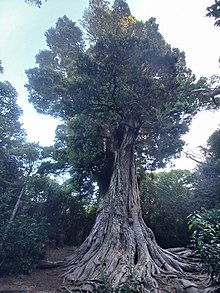Chrysorthenches polita
| Chrysorthenches polita | |
|---|---|

| |
| Scientific classification | |
| Domain: | Eukaryota |
| Kingdom: | Animalia |
| Phylum: | Arthropoda |
| Class: | Insecta |
| Order: | Lepidoptera |
| Family: | Plutellidae |
| Genus: | Chrysorthenches |
| Species: | C. polita
|
| Binomial name | |
| Chrysorthenches polita | |
| Synonyms[2] | |
| |
Chrysorthenches polita is a species of moth in the family Plutellidae.[3] It was first described by Alfred Philpott in 1918. It is endemic to New Zealand and it has been observed in both the North and South Islands. This species likely has two broods a year with one emerging in late spring and other in summer. The larvae mine leaves of Podocarpus species including Podocarpus totara. Adults have been observed on the wing in July to October and December to March.
Taxonomy
[edit]This species was first described by Alfred Philpott in 1918 using a specimen collected at Tisbury in Invercargill and named Orthenches polita.[4][2] George Hudson discussed and illustrated this species in his 1928 book The butterflies and moths of New Zealand.[5] In 1996 John S. Dugdale placed this species in the genus Chrysorthenches.[2] The male holotype is held at the New Zealand Arthropod Collection.[6]
Description
[edit]
Philpott described the male adult as follows:
♂. 11mm. Head whitish-brown. Palpi white, brownish beneath. Antennae bronzy-brown, broadly annulated with white. Thorax shining-dark brown. Abdomen and legs grey-fuscous. Forewings rather long, costa moderately arched, apex obtuse, termen rounded, oblique : shining brassy with cupreous reflections ; a large white oviform spot in middle near base; a broad white striga from dorsum at middle reaching half across wing ; an irregular white blotch above tornus ; a streak of purplish-violet from beneath basal spot along fold to tornus, attenuated at extremities and interrupted at median fascia and before tornus ; a similarly coloured but more obscure streak from above median fascia to tornal blotch : cilia grey, darker round apex. Hindwings and cilia grey.[4]
This species is small with a brassy ground colour to its forewings and frequently has a grey head.[2]
Distribution
[edit]This species is endemic to New Zealand and has been observed in both the North and South Islands.[1][2]
Behaviour
[edit]It has been hypothesised that this species has two broods a year with one developing over winter and emerging in late spring and the other emerging in summer.[2] Adults have been observed on the wing in July to October and December to March.[4][2]
Hosts
[edit]
The larva of this species mine the leaves of species of Podocarpus including Podocarpus totara.[2][7] As at 2020 the mines created by the larvae of this moth have not yet been described.[7]
DNA analysis
[edit]In 2020 this species along with the other species in the genus Chrysorthenches had their DNA and morphological characters studied.[8]
References
[edit]- ^ a b "Chrysorthenches polita (Philpott, 1918)". www.nzor.org.nz. Retrieved 2 December 2022.
- ^ a b c d e f g h J. S. Dugdale (January 1996). "Chrysorthenches new genus, conifer‐associated plutellid moths (Yponomeutoidea, Lepidoptera) in New Zealand and Australia". New Zealand Journal of Zoology. 23 (1): 33–59. doi:10.1080/03014223.1996.9518064. ISSN 0301-4223. Wikidata Q54576386.
- ^ Gordon, Dennis P., ed. (2010). New Zealand inventory of biodiversity: Kingdom animalia: chaetognatha, ecdysozoa, ichnofossils. Vol. 2. p. 463. ISBN 978-1-877257-93-3. OCLC 973607714. OL 25288394M. Wikidata Q45922947.
- ^ a b c Alfred Philpott (1918). "Descriptions of new species of Lepidoptera". Transactions and Proceedings of the New Zealand Institute (in English and English). 50: 131. ISSN 1176-6158. Wikidata Q109591818.
- ^ Hudson, G. V. (1928), The butterflies and moths of New Zealand, Illustrator: George Hudson, Wellington: Ferguson and Osborn Limited, p. 329, LCCN 88133764, OCLC 25449322, Wikidata Q58593286
- ^ Dugdale , J. S. (23 September 1988). "Lepidoptera - annotated catalogue, and keys to family-group taxa". Fauna of New Zealand. 14. Department of Scientific and Industrial Research: 74. doi:10.7931/J2/FNZ.14. ISSN 0111-5383. Wikidata Q45083134.
- ^ a b Michael P Donovan; Peter Wilf; Ari Iglesias; N Rubén Cúneo; Conrad C Labandeira (25 November 2020). "Persistent biotic interactions of a Gondwanan conifer from Cretaceous Patagonia to modern Malesia". Communications Biology. 3 (1): 708. doi:10.1038/S42003-020-01428-9. ISSN 2399-3642. PMID 33239710. Wikidata Q102388906.
- ^ Jae-Cheon Sohn; Shigeki Kobayashi; Yutaka Yoshiyasu (10 March 2020). "Beyond Wallace: a new lineage of Chrysorthenches (Lepidoptera: Yponomeutoidea: Glyphipterigidae) reveals a journey tracking its host-plants, Podocarpus (Pinopsida: Podocarpaceae)" (PDF). Zoological Journal of the Linnean Society. 190 (2): 709–736. doi:10.1093/ZOOLINNEAN/ZLAA009. ISSN 1096-3642. Wikidata Q106700659.
